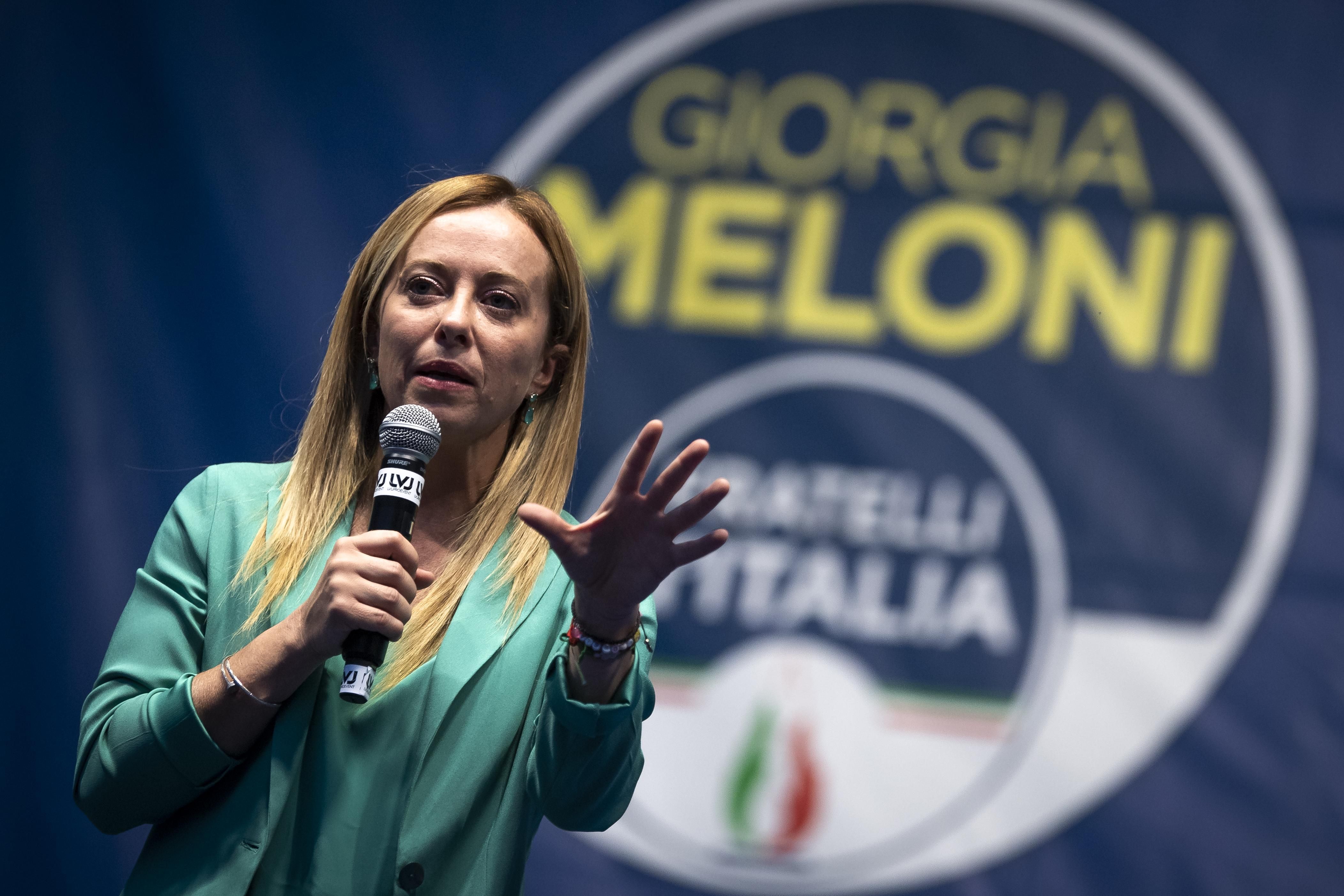Until recently, Giorgia Meloni was on the fringes of Italian politics. Now the leader of the far-right Brothers of Italy Party is likely to become the country’s first female prime minister when Italians head to the polls on Sept. 25.
A self-styled anti-globalist, Meloni has for the most part embraced her far-right reputation within an Italian electorate that relishes anti-establishment candidates. But in an age when the term ‘far-right’ has become a catchall, what does Meloni really stand for and what will her election mean for Italy’s politics and economy?
Mother of the Brothers
Meloni – a former minister for youth in then Prime Minister Silvio Berlusconi’s cabinet – has headed the breakaway nationalist Brothers of Italy Party since 2014. Avowedly anti-immigrant and proud of its nativist bonafides, the party has roots in Italy’s neofascist parties of the 1940s.
Meloni’s party is currently slated to reap 25% of the vote, while her three-party coalition – including Matteo Salvini’s far-right Lega Party and Berlusconi’s Forza Italia – would together secure around 45%. The bloc, expected to win majorities in both legislative chambers, could even win a two-thirds supermajority. Importantly, this would allow it to make constitutional changes without holding a referendum.
Indeed, Meloni’s conservative far-right credentials are well-established. In refusing to join former Prime Minister Mario Draghi’s center-left national unity government last year, she emerged as an attractive candidate for protest voters (Salvini and Berlusconi both supported it). She has called immigration to Italy a form of “ethnic substitution” and has rallied against globalist elites as well as the “LGBT lobby.”
A former journalist and Italy’s youngest-ever cabinet minister, Meloni is not your run-of-the-mill far-right nationalist. Unsurprisingly, she is not a huge fan of the European Union, saying at a recent debate: “If I win, for Europe, the fun is over,” adding that Brussels should leave “the issues closest to the lives of citizens” to member states. What’s more, the Brothers have aligned in the European parliament with Poland’s Law and Justice Party that’s long been on a collision course with the EU.
Still, Meloni’s not a proponent of tear-it-down politics. Unlike her coalition partners, Meloni is firmly pro-NATO and supports Brussels’ ongoing economic sanctions on Russia. But Meloni also says that European solidarity “has limits,” calling out Germany in particular for opposing caps on the price of gas because of contracts with Russian state energy companies.
A tricky balancing act. Meloni appears to have tempered her tough-on-Brussels stance in recent weeks, emphasizing that she’s not keen to pick fights and will prioritize Italy’s economy, burdened by massive debt and an energy crunch.
A savvy politician who joined the political fray as a student, Meloni also knows that solid ties with Brussels are crucial to keeping Italy’s economy afloat. As part of Brussels’ bloc-wide pandemic recovery plan, Rome is slated to get almost 200 billion euros from the EU Commission. Brussels also bailed out Rome in 2012 from a debt crisis, and although Italy’s debt to GDP ratio remains sky-high – more than 150% at the end of 2021, which puts it in the world’s top 10 – it is manageable only because the European Central Bank has bought much of Italy’s debt.
“European debt substitutes Italy's debt,” says Carlo Bastasin, a Europe economic and political expert at the Brookings Institution. Indeed, the ECB bought 250 billion euros worth of Italian debt between March 2020 and December 2021 to stabilize the eurozone.
However, the doling out of post-COVID funds is contingent on Italy enforcing structural economic reforms. The incoming far-right coalition has said the EU provisions should be amended given recent geopolitical developments. But it has also proposed broad tax cuts among other big spending schemes that will certainly make for some frosty conversations in Brussels.
One of the most important factors in determining the stability of the government, Bastasin says, “is how the European Central Bank will manage the required increase in interest rates” to curb inflation. If its intervention is too heavy- handed, he says, it might “corner Italy’s government, making its financial situation unstable and the basis of the government wobbly.”
As Italy prepares to usher in its most Eurosceptic government in years, some analysts have pointed to Hungary’s complex relationship with Brussels as a sign of what’s to come. Under ultra-conservative PM Viktor Orbán, Budapest has refused to comply with EU reforms needed to unlock much-needed cash. But Bastasin says the comparison between the two is flawed: “Hungary has been subsidized by the EU Commission and EU partners forever, while Italy is a net creditor to the Commission. It gives to Brussels more than it receives.”
What’s more, he adds, Italians, for the most part, have a lot of love for the European Union. “In Poland and Hungary they don't have the same affinity for European integration. They never have.”
Meloni is likely to come into office with a solid mandate to govern, but the road ahead will be anything but smooth.
